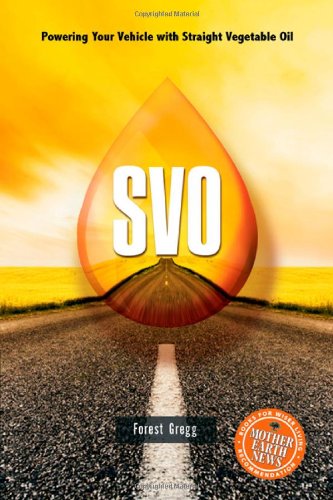“There is a lot of information out there about the pros and cons of biofuels – more cons than pros recently. but still, nothing seems to beat Straight Vegetable Oil (SVO). It’s cheap, carbon-neutral, uses a waste product and does not depend upon centralized corporate infrastructure.
And now there is a definitive guide to fueling your diesel engine with this alternative fuel. SVO-Powering Your Vehicle with Straight Vegetable Oil cuts through the masses of often contradictory, erroneous and confusing information on the subject and provides a practical guide. It also, importantly and uniquely, explains what is necessary to convert a diesel engine and how to do it properly. there are facts, figures, charts, grpahs, diagrams, and lots of technical detail but, with all its detail, the book is still very accessible.
Gregg knows his stuff; he is a former researcher with Frybrid, a leading developer of veggie oil conversion systems, and has worked as a designer, fabricator and installer of SVO conversion systems.” – Natural Life Magazine
The benefits of straight vegetable oil (SVO) as an alternate fuel for diesel engines are many. SVO is cheap, carbon-neutral, uses a waste product, and does not depend upon centralized corporate infrastructure.
Authors Christopher Goodwin and Forest Gregg are the founder and designer, respectively, of Frybrid, the most respected vegetable oil conversion company in the United States. They have many combined years of expertise in the use of straight vegetable oil as a fuel and have sifted through the masses of contradictory, erroneous, and confusing information on the subject, extracting the very best information available. Chapters include:
- Vegetable oil sources, extraction, and refining
- Viscosity
- Chemical degradation
- Fuel properties
- Contaminants
- System design
- Engine modifications
SVO is the only book available that explains exactly what is necessary to convert a diesel vehicle and how to do it properly. It gives readers the tools to sort through the different companies and online plans to find something that works well. While technical in nature, this fully illustrated book is very accessible. Each concept is introduced and described in great detail.
Designed to educate new consumers, it is also a resource for current conversion owners.
Forest Gregg is a researcher with Frybrid, and has worked as a designer and installer of the conversion systems.
Christopher Goodwin has been in the automotive business for twenty years, has owned two shops specializing in German auto repair, and is the founder of Frybrid, the most respected vegetable oil conversion company in the United States.
List Price: $ 18.95
Price: [wpramaprice asin=”0865716129″]


